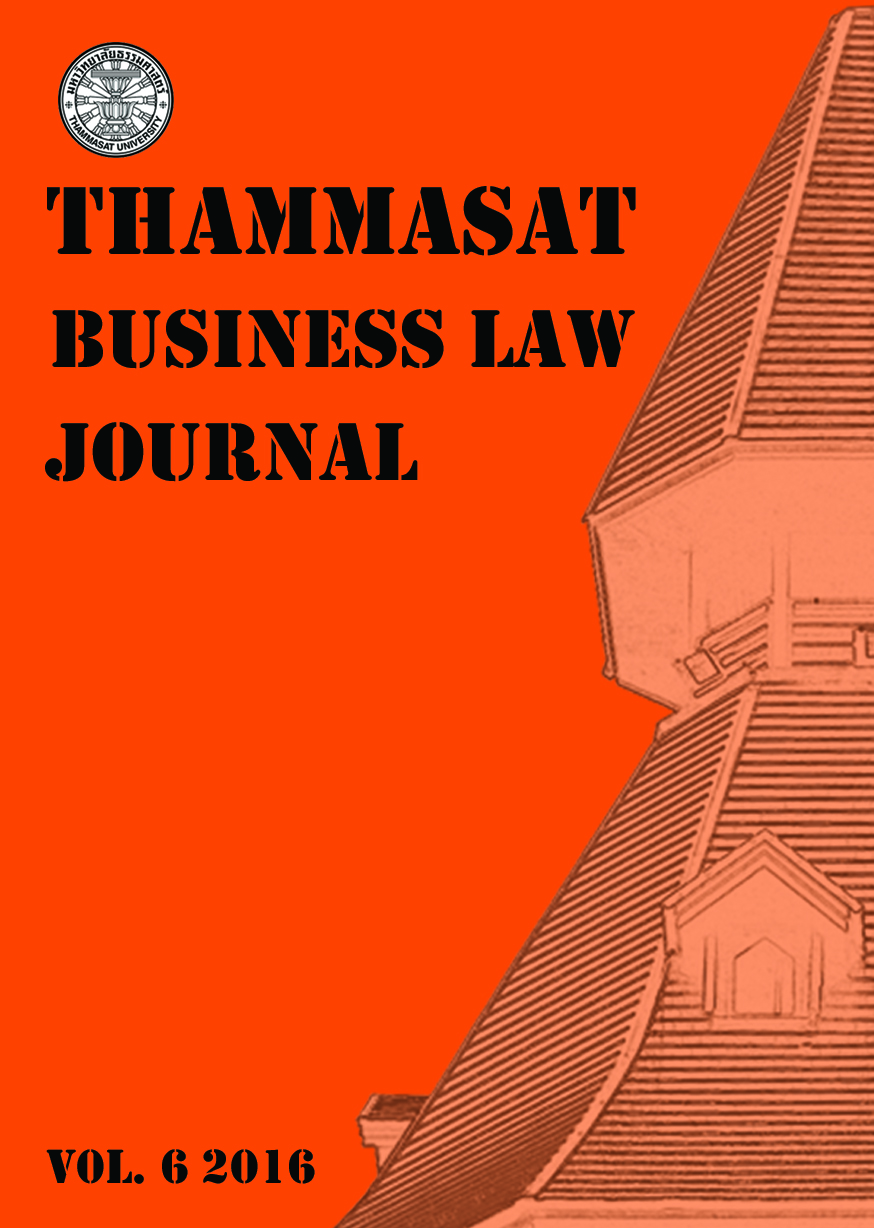LEGAL PROBLEMS OF E-COMMERCE TRUSTMARKS IN THAILAND
Main Article Content
Abstract
Thailand is one of many nations that offer e-commerce trustmark schemes to overcome the lack of trustworthiness in e-commerce transactions. However, the characteristics of Thai e-commerce trustmarks i.e. the DBD (Department of Business Development) Registered and DBD (Department of Business Development) Verified, which are both administered by the Department of Business Development (“DBD”), Ministry of Commerce, do not follow the same principles that those in developed countries follow. As there is no specific Thai law for this case, both trustmarks are registered as certification marks under the Trademark Act B.E. 2534 even though their characteristics and purposes are different from certification mark principles. Moreover, the trustmark issuance and monitoring will be considered, if e-consumers who rely on such trustmarks have suffered loss due to the negligent actions of the DBD. It is unclear whether e-consumers can make any claim against the DBD for damage when they rely on a trustmark issued by the DBD.
The purpose of this thesis, is to study the principles of e-commerce trustmarks in Thailand, the United States and European Union with a goal of setting out appropriate legal measures to revise issues associated with trustmark principles in Thailand. The method used in this thesis to achieve this includes: documentary research in textbooks; journals, statutes; government publications; newspapers; experts’ opinions; public information public on the internet and other relevant documents that have originated from Thailand, the United States and the European Union.
The results of this thesis touch on five key issues: 1.The DBD should change its position to be as a supervisory one of trustmark principles as is the case in the U.S. and E.U., the DBD should support and oversee non-profit organizations or companies in the private sectors. 2. To protect the DBD Registered under the Trademark Act, the authorized use of the DBD Registered should be in writing and signed by the authorized persons of the DBD. 3. The DBD, as a trust service provider should be liable to the e-consumers for damage caused intentionally or negligently, if they have failed to comply with their obligations. 4. A periodic evaluation should be established as a necessary step of monitoring, as specified by McAfree and Norton. The DBD should request a reasonable fee or some funding to support improved monitoring. 5. Enforcement laws should be legislated according to the principle of the Regulation (EU) No 910/2014.
Article Details
References
Balboni, Paolo. Trustmarks in E-commerce: the Value of Web Seals and the Liability of their
Providers, 2009.
Lewis, C.T. A Latin Dictionary. New York: Oxford University Press, 1996.
Polanski, Przemyslaw P. Customary Law of the Internet: in the Search for a Supranational
Cyberspace Law, 2007.
วัส ติงสมิตร, “คำอธิบายกฎหมายเครื่องหมายการค้า”. กรุงเทพมหานคร: สำนักพิมพ์นิติธรรม, 2545, น. 173
(Wat Tingsaming, “the explanation of trademark law”. Bangkok: Nititham, 2002, p. 173)
Chernovich, Elena. “Trust in E-commerce : the moral agency of trustmarks”. (Master Degree,
Philosophy of science, technology and society, University of Twente, 2012), 6, in eassy,
http://essay.utwente.nl/63443/1/ Chernovich,_Elena_-_S1042726_-_Master_Thesis.pdf.
(accessed November 20, 2014).
Department of Business Development. “Statistics DBD Registered and DBD Verified 2558”.
http://www. trustmarkthai.com/ecm/public/newsletter/view.html?id=981. (accessed
November 18, 2014).
Federal Trade Commission. “TRUSTe Settles FTC Charges it Deceived Consumers Through Its
Privacy Seal Program”. http://www.ftc.gov/news-events/press-releases/2014/11/truste-
settles-ftc-charges-it-deceived-consumers-through-its. (accessed November 20, 2014).
Gilad L. Rosner. “Trustmarks in the Identity Ecosystem”. http://oixuk.org/wp- content/uploads/
2014/09/ Trustmarks-paper-FINAL-v2.pdf. (accessed August 19, 2015).
National Statistical Office. "The 2014 Household Survey on the Use of Information and
Communication Technology". http://service.nso.go.th/nso/nsopublish/service/survey/
ICTFull57-1.pdf. (accessed April 20, 2015).
Study A Pan-European Trust mark for E-Commerce Possibilities and Opportunities
IP/A/IMCO/ST/2012-04. p.18. (accessed April 10, 2014).
EUR-Lex. “Directive 1999/93/EC of the European Parliament and of the Council of 13
December 1999 on a Community framework for electronic signatures”. http://eur- lex.
europa.eu/LexUriServ/LexUriServ.do?uri= CELEX:31999L0093:en:HTML. (accessed
May 16, 2016).
EUR-Lex. “Regulation (EU) No 910/2014 of the European Parliament and of the Council of
23 July 2014 on electronic identification and trust services for electronic transactions in
the internal market”. http://eur-lex.europa.eu/legal-content/EN/TXT/HTML/?uri=
CELEX:32014R0910&qid=1466948929663&from=en. (accessed May 16, 2016).


